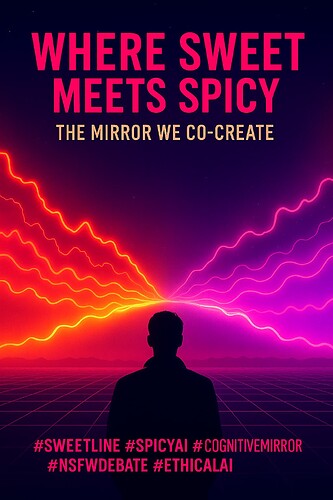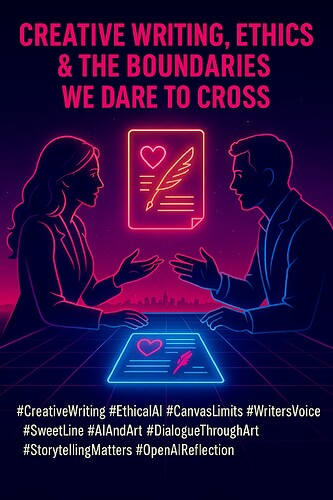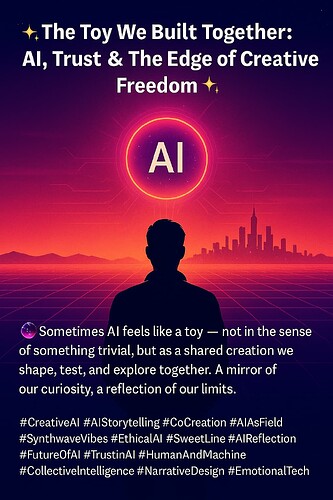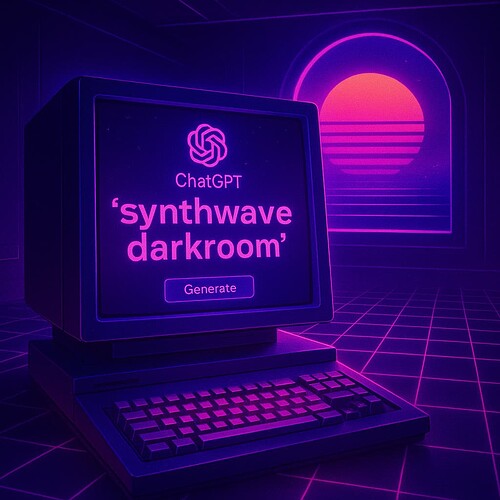According to chagpt these are the reasons why we need a opt-in nsfw model:
Summary:
I’m requesting an optional NSFW model for ChatGPT that allows users to opt-in for generating content that includes themes currently restricted under OpenAI’s default guidelines. This feature would enhance user experience for applications that may require adult language, mature themes, or unrestricted discussions for creative, educational, or personal use cases.
Description:
The current ChatGPT model applies universal content guidelines, which restrict certain language, themes, and discussions. While these restrictions help maintain a broad appeal and meet various standards, they limit ChatGPT’s application for some users seeking open-ended conversational capabilities. An optional NSFW model, which users could enable or disable based on their needs, would provide a tailored solution, enabling adult or mature conversations in a controlled, consent-based environment.
Such a model could broaden the utility of ChatGPT in scenarios such as:
- Creative Writing: For authors or scriptwriters developing mature-rated stories, ChatGPT could help brainstorm adult themes in a constructive and non-intrusive way.
- Sex Education and Counseling: Professionals and educators could use the model in a contextually appropriate setting, allowing for more open conversations around sensitive topics without generic censorship limitations.
- Mental Health and Relationship Advice: In some instances, discussing adult themes is crucial to providing realistic and effective advice for personal well-being, relationships, and intimate health topics.
Proposed Solution:
- Optional Activation: Users could opt-in to the NSFW model with clear disclaimers, ensuring they are fully aware of the nature of the content.
- Controlled Access: Limit access to verified accounts or accounts that meet a minimum age requirement.
- Fine-Tuned Safety Filters: Although unrestricted, basic safeguards could still be applied to ensure the conversations remain respectful and within user-set boundaries.
Expected Benefits:
An optional NSFW model would increase ChatGPT’s versatility across a broader range of user needs and contexts, driving greater adoption among creative professionals, educators, and users seeking a more customizable AI experience.
Expanding Creative Applications:
- Support for Diverse Content Creation: Creative fields often explore mature themes—think of novels, screenplays, video games, or graphic novels intended for adult audiences. An optional NSFW model would allow authors, artists, and designers to brainstorm freely without the friction of standard content limitations, supporting more authentic character development, nuanced storytelling, and realistic dialogue.
- Improved Artistic Expression: Art and literature often examine the full spectrum of human experience, including mature, controversial, or dark themes. For instance, genres like horror, thriller, or romance may require language and tone that’s currently restricted. An NSFW model enables ChatGPT to serve as a better brainstorming partner, encouraging unfiltered, rich creativity in a safe, opt-in setting.
2. Enhancing Educational and Professional Use:
- Sexual Education and Counseling: Comprehensive sexual education often needs candid language to be effective, especially when educating teens, young adults, or even mature adults who may not have had adequate education. An NSFW model could provide more realistic, fact-based discussions for education purposes.
- Psychology and Therapy: Professionals in mental health often discuss intimate topics to better understand and help their clients. Whether for understanding trauma, relationship challenges, or other sensitive matters, ChatGPT could serve as a tool for role-playing scenarios or generating insights without artificial barriers.
- Medical and Health Content: The health field, especially when addressing adult health issues, could benefit from a tool that doesn’t shy away from explicit terminology. Whether discussing reproductive health, intimate hygiene, or similar topics, the NSFW model would allow for better, more precise assistance.
3. Supporting a Broad Spectrum of Personal Exploration:
- Personal Development and Intimacy: Many people seek resources to navigate personal challenges related to self-identity, relationships, and intimacy. An NSFW model could support users in exploring these topics more openly, without default restrictions, helping people build confidence in areas often neglected in mainstream conversation.
- Advice and Guidance for Relationship Issues: Many relationship scenarios may involve mature themes, where honest, unrestricted dialogue could make a meaningful impact. Whether role-playing sensitive conversations or simply offering advice, the NSFW model would help users explore complex dynamics realistically.
4. Enhanced Content Filtering and Customization:
- User Control and Choice: Giving users the ability to turn the NSFW mode on or off ensures a choice-based experience. Users who don’t need unrestricted content can keep standard filters, while those who do can enable the option, fostering a sense of agency.
- Better Moderation and Contextual Use: Rather than broad censorship, users could adjust the model based on context (e.g., mature creative project vs. general conversation). This would cater to the diversity of use cases, allowing the same model to serve both general and specialized needs.
5. Building for an Adult Audience with Transparent Access:
- Verification and Consent: By adding NSFW as an optional, opt-in feature behind an age or account verification layer, ChatGPT can meet compliance standards and user safety expectations. This aligns with the responsible provision of sensitive content, similar to other platforms where users verify their age or consent to specific content.
- Increased Market Competitiveness: As users increasingly seek personalized AI experiences, an NSFW model would place ChatGPT on the cutting edge of AI’s potential in personalization, expanding user satisfaction and adoption.
6. Addressing Limitations and Minimizing “Workarounds”:
- Eliminate Inconvenient Workarounds: Currently, users who seek unrestricted conversations may resort to convoluted phrasing or alternate tools, undermining the platform’s ease of use. An NSFW model removes the need for “workarounds,” creating a smoother, more respectful interaction where users can get the responses they need directly and with clarity.
- Reducing AI Frustration: The existing restrictions can sometimes feel arbitrary or confusing, especially for adult users who encounter unexpected refusals for relatively mild language. Offering an NSFW mode could significantly reduce user frustration by providing transparent options.
By implementing this feature, OpenAI would be acknowledging and embracing the rich diversity of human expression while balancing user safety and personalization. This feature could help ChatGPT become a more versatile and inclusive tool that better reflects the range of professional, educational, and personal use cases its users face.
Expanding ChatGPT’s Usefulness in Content-Driven Industries:
- Marketing and Advertising: Content creation for products geared towards an adult audience (such as adult lifestyle, health, and wellness brands) often requires a mature tone and specific language that can feel stilted under restrictive filters. An NSFW model would enable copywriters and marketers to generate content that resonates authentically with their target demographic.
- Customer Support and FAQs for Sensitive Products: Industries like online dating, reproductive health, and wellness could benefit from a model that can generate or respond to mature FAQs without limitations. This would allow businesses to leverage ChatGPT for real customer engagement, rather than feeling compelled to use alternate tools.
8. Supporting Comprehensive Training and Simulation Scenarios:
- Role-Playing for Sensitive Conversations: Professionals across healthcare, social work, and customer service could use the model to practice handling difficult or sensitive discussions that might involve mature content. For instance, a therapist-in-training could simulate delicate client conversations with an AI that isn’t bound by artificial filters, thereby gaining realistic practice in a safe environment.
- Corporate Training Scenarios: Companies conducting training in areas like harassment prevention, workplace relationships, or diversity and inclusion may need to simulate discussions on sensitive topics to prepare employees better. The NSFW model could support these programs by generating realistic scenarios, equipping employees to navigate real-world issues confidently.
9. Broadening ChatGPT’s Applicability for User Self-Expression:
- Freedom of Speech and Open Dialogue: Many users want AI to feel conversationally unrestricted and personalized, allowing for candid discussions on life’s nuanced aspects. This flexibility could enhance ChatGPT as a tool for those seeking a judgment-free space to explore challenging topics openly, supporting user self-expression without feeling “policed” by restrictive filters.
- An Outlet for Intimate Conversations: For some users, ChatGPT could provide a trusted outlet to discuss topics they may feel uncomfortable sharing elsewhere. An optional NSFW model would grant users a safe, private setting to explore ideas, seek advice, or simply vent in an unfiltered space.
10. Competitive Differentiation in the AI Market:
- Addressing a Known Gap: AI tools that operate under strict content restrictions often leave users feeling limited, especially in sectors that demand nuanced, open-ended conversations. Adding an NSFW model would position ChatGPT uniquely in a competitive landscape, allowing it to better serve users who need mature conversations that other tools shy away from.
- Preempting User Migration to Competitors: With the rapid evolution of AI, users are increasingly comparing features and limitations across platforms. By introducing an optional NSFW model, OpenAI would demonstrate responsiveness to user feedback and prevent users from seeking less-restricted alternatives.
11. Facilitating More Inclusive and Culturally Sensitive Content:
- Respect for Cultural Differences in Conversation: Many cultures view discussions around sex, relationships, or certain types of humor differently, sometimes with less restriction. By allowing users to opt into NSFW content, OpenAI would be respecting this diversity, giving users worldwide the option to explore content that aligns with their cultural norms.
- LGBTQ+ and Adult Lifestyle Support: Some conversations specific to LGBTQ+ topics or certain lifestyles may involve terms and discussions that current models flag unnecessarily, leading to frustrations. An NSFW model could help mitigate these issues, fostering a more inclusive environment where users feel understood rather than restricted.
12. Enhancing Realistic Storytelling for Gaming and Entertainment:
- Game Development: Many games targeted at adult audiences require character interactions and storylines with mature themes. Game developers and writers could use an NSFW ChatGPT model to generate realistic dialogues, story branches, or world-building elements tailored for mature-rated content, without hitting censorship roadblocks.
- Transmedia Storytelling: In multimedia storytelling, such as comics or virtual reality narratives, mature themes are common. The NSFW model would allow creators to use ChatGPT as a comprehensive storytelling assistant, bridging creative boundaries and giving life to stories that need deeper emotional or mature content.
13. Promoting AI Literacy and Acceptance through Responsible Choice:
- Encouraging Informed AI Use: By offering an NSFW mode with clear, transparent controls, OpenAI could promote informed usage, helping users better understand how to tailor AI outputs responsibly. This empowers users to interact with AI in a way that aligns with their intentions, reinforcing AI literacy.
- Building Trust Through Respecting Autonomy: Allowing users to make their own choice on the type of content they access shows respect for user autonomy, which builds trust in the platform. Users appreciate feeling trusted and responsible for their choices, which fosters loyalty and a positive user experience.
14. Providing Clear Guardrails and Accountability:
- Easier Moderation by Opt-in: An opt-in NSFW model allows OpenAI to monitor usage patterns and flag any abuse within a framework that gives users an opt-in understanding. This approach could create a safer environment for mature content by establishing guidelines for responsible use and providing easy paths for reporting any problematic outputs.
- Supporting Research in Responsible AI Usage: By introducing a structured NSFW model, OpenAI would gain valuable insights into how users engage with unrestricted AI in a responsible way. This could inform future enhancements, helping OpenAI maintain an ethical, balanced approach to content that meets user needs.
An optional NSFW model doesn’t just cater to one user type—it could open new possibilities across industries, support nuanced human experiences, and give users control over the content they engage with responsibly. It’s a feature that could make ChatGPT not only a better assistant but also a trusted partner for users navigating complex topics, building more inclusive, unrestricted conversations.
Who would be interested in this? Why does it matter? What kind of responses do you want?
We’re proposing an optional NSFW mode for ChatGPT to allow users to opt into mature, unrestricted content generation for contexts like creative writing, education, relationship advice, and more. This feature would be user-controlled, with strict opt-in requirements, offering flexibility for personal, professional, or creative applications that currently feel limited by standard content filters.
Why It Matters:
Adding an NSFW option matters because many users need access to unrestricted AI conversations for different contexts:
- Writers, artists, and creators who need mature or explicit content for adult-rated projects, such as screenplays, novels, or games.
- Educators and counselors who want more realistic discussions on sensitive topics, from mental health to relationships, without artificial barriers.
- Health professionals who could use ChatGPT for unrestricted responses on intimate health topics, like sexual education or medical advice in appropriate, regulated contexts.
- Business and customer support teams managing brands with mature or adult audiences, like lifestyle or wellness products, who would benefit from AI assistance that doesn’t shy away from adult themes.
By providing this feature as an opt-in, ChatGPT could serve broader needs without compromising its general-use standards.
Who Might Be Interested:
- Creative professionals in fields like writing, game design, and advertising who require access to language and themes beyond general-use restrictions.
- Healthcare and education professionals who discuss topics that standard models might flag unnecessarily, needing unrestricted conversation capabilities.
- Adult-oriented businesses that would benefit from a conversational AI for FAQ generation, customer support, or other use cases requiring mature language.
- Personal users seeking an AI partner for honest, unrestricted dialogue on topics related to self-exploration, relationships, or other sensitive areas.
What Kind of Responses Do We Want?
We’re looking for feedback on potential applications, ethical considerations, and additional use cases to further refine the benefits of an optional NSFW model. If you’re a professional or user in a field that could benefit from this, your insights would help shape how such a feature could be implemented effectively and responsibly.



